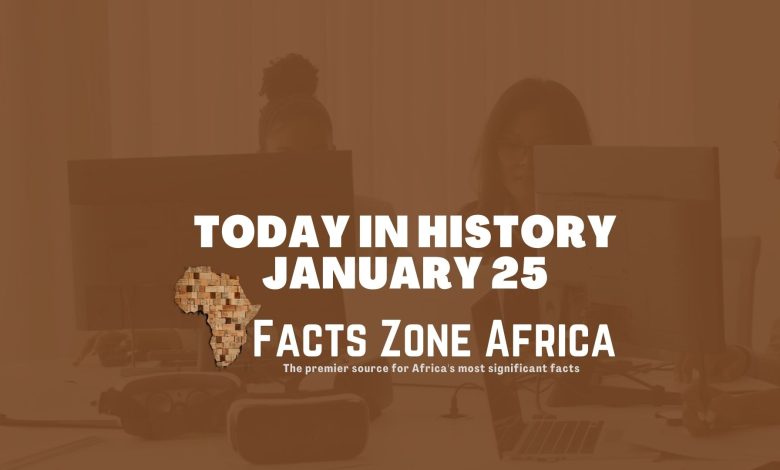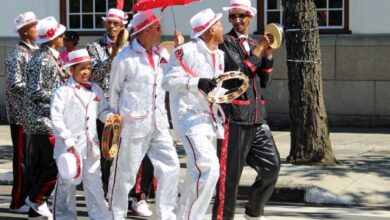Black HistoryBlack History FactsOn This Day in Black History
Today In History, January 25

Today in history, January 25, we commemorate black heroes and villains, the leaders and rebels, the artists and performers, the scientists and scholars, the diplomats and writers, the athletes, adventurers, and everyday individuals accomplishing extraordinary feats. The significant milestones of triumphs and tragedies are vividly preserved as part of our shared history.
ALSO READ: 2023’s 100 Most Influential Africans List – Dominated by Nigerians and South Africans
2023’s 100 Most Influential Africans List – Dominated by Nigerians and South Africans
Today In History, January 25
1576:
- São Paulo da Assumpção de Loanda (Luanda, Angola) is established by Portuguese explorer Paulo Dias de Novais, with a population of 100 families of settlers and 400 soldiers.
1858:
- The cornerstone is laid for Liberia College, financed by U.S. organizations, becoming the University of Liberia in 1862.
1867:
- The Natal Railway Company extends its line to Umgeni in South Africa, facilitating the transport of quarried stone to Durban harbor.
1900:
- The East London Municipality in South Africa inaugurates an electric tramway system for efficient transportation around the town.
1915:
- Government Skool, a preparatory school for theological studies in Potchefstroom, South Africa, becomes the first higher learning institution to teach in Afrikaans.
1952:
- British troops attempt to disarm rebellious police in Ismailia, Egypt, resulting in the deaths of 50 auxiliary policemen, sparking anti-European rioting in Cairo.
1960:
- The Second All-African People’s Congress opens in Tunis, Tunisia, advocating for an “international corps of volunteers” to support Algerian and Moroccan independence.
1964:
- British commandos suppress a mutiny of Tanganyikan (Tanzania) soldiers at the request of President Julius Nyerere.
ALSO READ: The History Of Africa Before Colonisation
1971:
- A military coup d’état removes Milton Obote, Uganda’s Prime Minister, and Idi Amin assumes power, beginning mass killings to maintain his dictatorship.
2018:
- Kenya’s short film drama “Watu Wote” earns an Academy Award nomination for Best Live Action Short Film, based on the true story of Kenyan Muslims protecting Christians.
2019:
- Angola’s parliament ends discrimination against people based on sexual orientation, with penalties for refusal to employ or provide services.
2021:
- A survey finds that Algeria’s Tangier’s port is the busiest in the Mediterranean, handling 47% of Morocco’s cargo in 2020.
1926:
- Youssef Chahine, Egyptian film director, is born in Alexandria, Egypt.
1937:
- Angie-Félix Patassé, the first leader of the Central African Republic elected in a free and fair democratic election, is born in Paoua, Ubangi-Shan.
1980:
- Black Entertainment Television (BET) begins broadcasting.
1950:
- Gloria Naylor, a writer, is born.
1851:
- Sojourner Truth addresses the first Black Women’s Rights Convention.
ALSO READ: Black slave Thomas Fuller, known as the Human Calculator
Additionally, on January 25, 1972:
- Shirley Chisholm announces her campaign for President of the United States. She later becomes the first African American Presidential nominee and female Democratic Presidential nominee at the Democratic National Convention on July 13, 1972, receiving 152 first-ballot votes. Chisholm was a significant figure, being the first African American woman elected to Congress in 1968 and serving seven terms in Congress until 1983. She was also a founding member of the Congressional Black Caucus in 1971.
Advertisment





